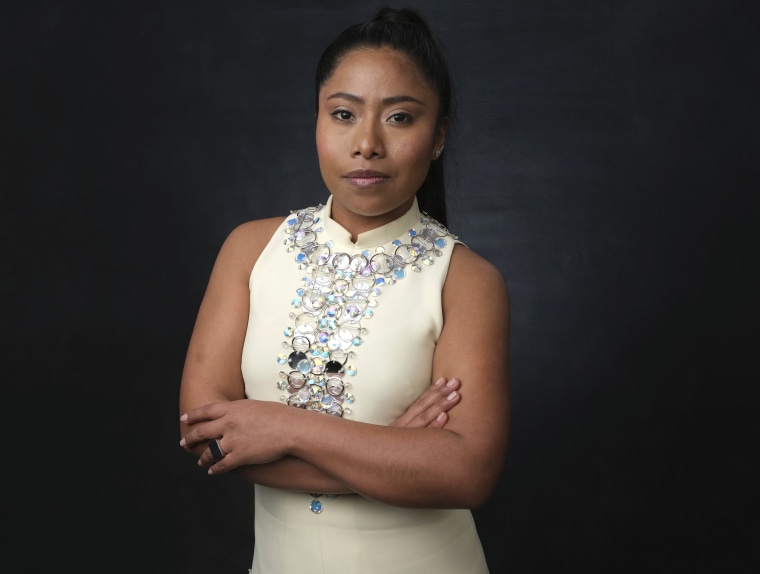It is quite an unlikely road that brings best actress nominee Yalitza Aparicio to the Academy Awards on Sunday night for her role in "Roma," one of the most talked about films of the year and a contender for 10 Oscars, including best picture.
“I’m feeling good,” Aparicio, 25, told NBC News. “I’m so happy with the nomination.”
Just a few years ago, Aparicio had completed her studies to become a teacher in Tlaxiaco, in the state of Oaxaca in southern Mexico. Her sister Edith, who was the family performer, convinced Aparicio to go to a movie audition that she couldn't make because she was pregnant. Aparicio didn't think much of it at first, and when she got the part and met the director, she had never heard of him.
That was OK with the director, Alfonso Cuarón — the internationally acclaimed filmmaker who won the best director Oscar in 2013 for "Gravity" — and he told Aparicio that she should avoid watching his other movies until after they had finished shooting theirs.
That casting call has led to international stardom for Aparicio and the first Oscar nomination for an indigenous actress from Mexico.
In "Roma," Aparicio plays Cleo, a young, mild-mannered housekeeper who is sometimes treated like family by her employer and sometimes not. Cleo is quiet and shy, a bit like Aparicio in real life. The nature of Cleo’s position in the household may keep her reserved, but her eyes hold a world of empathy that her employers may never fully understand or appreciate.
The character, the heart of the movie, is based on the memories Cuarón had of his family housekeeper Liboria “Libo” Rodríguez, who was a big part of his childhood growing up in the 1970s in the middle-class neighborhood of Roma, in Mexico City. “Roma” acts like a re-evaluation of past pains and current issues, including class and race in Mexico.
"I’m so proud,” Aparicio said of her chance to represent an indigenous, rural Mexican on the big screen, something that is rarely seen.
“I’m showing off the diversity we have in Mexico. I’m representing this community that is extremely talented but sometimes, we don’t notice them," Aparicio said. "I feel this responsibility because I feel the need to represent them in the right form that they deserve.”

While a few of Aparicio’s dissenters have revealed the persistence of classist and racist attitudes that persist in Mexico, most of the public response to her film debut has been overwhelmingly positive, with many celebrating Aparicio as a long overdue step in the right direction for diversity in film.
When she graced the cover of Vogue Mexico, the magazine published her photo and story with the phrase, “A star is born” in both Spanish and Mixtec, the indigenous language still spoken in some regions of Mexico and the one she had to learn for her role. Aparicio says she’s seen some of what’s said about her on social media and sees more hope than hate online.
“It’s wonderful to see this support they’re giving,” she said. “It’s incredible because independent from how wonderful it is, it’s something that’s not just for me, but there’s going to be more opportunities for people like me.”
On the day of the Oscar nomination, a video of her reaction to the news quickly went viral, her joy infectiously spread throughout social media.
“I was with women that I’ve been working with on ‘Roma’ for some time,” she said. “I hadn’t even realized that they were recording me. After everything, they asked me if I wanted to post the video, and I said yes!”
Overcoming shyness, no scripts and a new language
As a newcomer to the world of film, Aparicio already had much to learn on set. That her director didn’t give her — or anyone else — a script presented its own challenges.
“I would sometimes wonder what was going to happen tomorrow, what was going to happen to the characters and what they were going to film, but no matter how much I thought about it, it wasn’t helping me,” she said. “Better to observe all the work everyone was doing and everything that was going on so I would force myself to learn something beyond my own character.”
On top of the challenges of navigating a new job, Aparicio had to work on overcoming her shyness, one of the reasons her sister pushed her to audition.
“Before ‘Roma,’ I didn’t have the capacity to talk in front of cameras or to many other people,” Aparicio said. “On the first day of shooting, I was so nervous, I tried to calm myself with breathing. I don’t know how my nervousness didn’t show up on camera. There were so many people around me, putting their attention on every little detail. There were people working on the art and production design, and Alfonso was focusing on what he was going to shoot and moving the camera. When they said they were ready to go, I knew I couldn’t go back.”
“And yes, I still am nervous,” she said. “I remember a director told me: ‘You’re such a good actress. They told me you were nervous.’ In the Golden Globes, I was laughing, but my legs couldn’t stop shaking. I didn’t even get up from my seat because I couldn’t control my legs from shaking, I was sweating and my hands were cold.”
This learning on set helped Aparicio the most when it came time for her to recite her lines in Mixtec.
“In my community, it’s been years since this language has been lost,” she said. “So I didn’t have a relationship to Mixtec. Once a year, I would hear the grandparents in the community speak it, but it wasn’t sufficient. The Mixtec in the movie is from another town, Guadalupe Miramar, so it was very different than the one I grew up hearing.”
To bridge her performance with her real-life inspiration, Cuarón offered to arrange a meeting between his childhood housekeeper Rodríguez and Aparicio before shooting began.
“I went directly to talk to her, and she told me some parts of her story but nothing about what was going to happen in the movie,” Aparicio said. “She’s an incredible woman. Now that I’ve gotten to know her story, I admire her more because she continues to have that love and kindness. She’s so attentive to everyone.”
In fact, it was Libo who made Aparicio feel more secure about what was to become her Oscar-nominated performance.
“I wasn’t sure I was going to do her justice in the movie, and Alfonso speaks so highly of her. He loves her so much, and she loves him, too," said Aparicio, who said Libo was more modest about her accomplishments and her role in the director's life. "She told me, ‘Alfonso only knows the Libo that he knows.’”
After embarking on her grand “Roma” adventure, Aparicio is ready for wherever that next step in her career may take her. “I don’t know what’s next,” she said. “I’d like to keep acting in more movies. I’d love to keep sharing more stories with society.”
She said she’ll go “wherever the opportunity presents itself. I’ll always love Mexico, and if an opportunity presents itself there, then perfect.”
FOLLOW NBC LATINO ON FACEBOOK, TWITTER AND INSTAGRAM.


